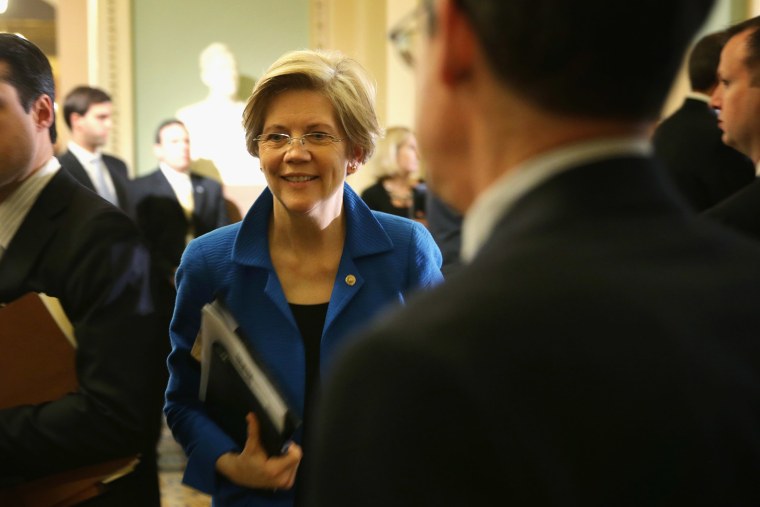Massachusetts Sen. Elizabeth Warren this week promised to campaign in Kentucky for Democrat Alison Lundergan Grimes, who's challenging Senate Republican Leader Mitch McConnell. It's a noteworthy vow for Warren, arguably the Senate's highest-profile Democrat, to wade into 2014's marquee contest . But it's also part of a less-noteworthy trend of Democratic women campaigning for other Democratic women.
“She’s tough, she’s feisty," Warren said of Grimes. "I’m going to get out there and try and make this happen for her.”
By sticking together, Democratic women are the best advocates for growing their numbers, experts say.
“Women in the Senate see themselves as a group because they are the minority in the most powerful men’s club in the world," Debbie Walsh, director of the Center for American Women and Politics (CAWP) at Rutgers University, said. "They’re breaking into that men’s club and I think it gives them a sense of identity as women in this group, they are still the outsider.”
While women voters outnumber men in the U.S., just 20 of the Senate's 100 members are women.
This year’s midterms have had vivid examples of Democratic women fighting for each other: both Warren and Hawaii’s Democratic Sen. Mazie Hirono have sent fundraising emails for Sen. Jeanne Shaheen, a New Hampshire Democrat facing a challenge from Republican Scott Brown. Brown previously represented Massachusetts in the Senate until he lost to Warren in 2012.
"Jeanne Shaheen has been a steadfast ally of mine on crucial issues including women's health, LGBT equality, and energy efficiency & sustainability,” Hirono wrote in her email plea.
North Dakota’s Sen. Heidi Heitkamp has headlined three fundraisers in West Virginia for Democrat Natalie Tennant, the state's secretary of state hoping to best GOP Rep. Shelley Moore Capito for the seat left open by Democratic Sen. Jay Rockefeller's retirement. Tennant declared herself the “Heidi Heitkamp of 2014,” aligning herself with the first female senator of a deeply red state who won by less than 3000 votes in 2012.
In February, Sen. Debbie Stabenow headed to Georgia to help out Democrat Michelle Nunn as she attempts to win the open Senate seat there. Republican Saxby Chambliss is retiring.
In North Carolina, Minnesota Sen. Amy Klobuchar has campaigned for Sen. Kay Hagan in her tough re-election bid there.
"They know that we need to add more women to their ranks. There really is a sisterhood among these women and it's great seeing them help each other out on the campaign trail,” EMILY’s List president Stephanie Schriock said.
With just four Republican women in the Senate, Walsh said, when it comes to campaigning there just isn't the same critical mass. The GOP still doesn't "have the same kind of bench to deploy when Republican women are running,” she said.
Nebraska GOP Sen. Deb Fischer helped Moore Capito out with a fundraising appeal this winter, the AP reported.
With Democratic women out in force on the campaign trail—and so few Republican women senators to do the same, it “adds to the perception that the Republican Party isn’t in touch with women,” Walsh said. “It’s a Catch 22.”
